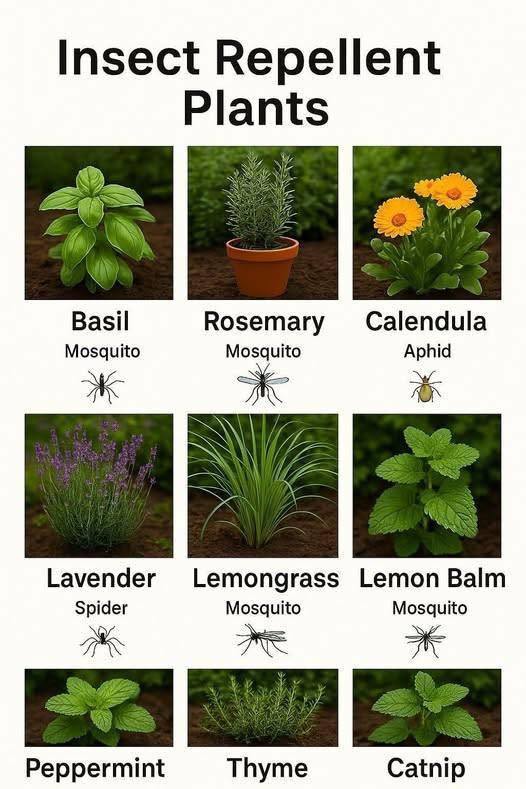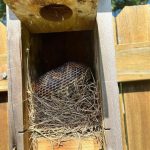ADVERTISEMENT
In warm seasons, mosquitoes can turn a peaceful garden into an itchy nightmare. While chemical sprays and traps are available, many people are turning to natural solutions that are safer for humans, pets, and the environment. Certain plants naturally repel mosquitoes and other insects thanks to the strong scents and essential oils they release. Here are 10 of the best mosquito-repellent
plants you can grow in your garden to create a beautiful and bug-resistant space.
Row 1: Culinary & Aromatic Defenders
1. Basil (Ocimum basilicum)
Repels: Mosquitoe
Basil is more than just a kitchen staple. Its intense aroma, especially varieties like lemon or cinnamon basil, confuses mosquitoes and keeps them at bay. It contains compounds such as estragole, citronellal, and limonene that are effective against various insects.
How to use:
Plant basil in pots or borders near patios and entryways.
Crush the leaves occasionally to release more scent.
Bonus: Use the fresh leaves in pasta, salads, or pestos.
2. Rosemary (Salvia rosmarinus)
Repels: Mosquitoes
Rosemary’s pine-like scent is pleasing to humans but irritating to insects. It contains eucalyptol and camphor, which are natural insect deterrents.
How to use:
Add sprigs to your garden beds or grow in large containers.
Burn dried rosemary on a barbecue or firepit to release mosquito-repelling smoke.
Use in cooking, especially grilled meats and stews.
3. Calendula (Calendula officinalis)
Repels: Aphids (and deters some mosquitoes)
Also known as pot marigold, calendula’s vibrant flowers do more than add color. They emit a subtle fragrance that deters pests like aphids, whiteflies, and some mosquito varieties.
How to use:
Plant in borders or among vegetables.
Use dried petals in teas or homemade salves for their anti-inflammatory properties.
Row 2: Lemon-Scented and Fragrant Foes
4. Lavender (Lavandula angustifolia)
Repels: Mosquitoes, moths, flies, and spiders
Lavender is not only beloved for its soothing scent and beautiful purple flowers, but it’s also a powerhouse against bugs. The linalool in lavender oil is effective in repelling mosquitoes and calming the nervous system.
How to use:
Plant along walkways or in sunny spots.
Hang dried bundles indoors or place in sachets in drawers.
Rub the crushed flowers on the skin as a light repellent.
5. Lemongrass (Cymbopogon citratus)
Repels: Mosquitoes
Lemongrass is the plant behind citronella oil, a key ingredient in many insect repellents. The plant itself, when brushed or bruised, releases strong citronella compounds.
How to use:
Grow in pots (especially in colder climates where it’s not hardy).
Trim and crush the blades occasionally to maximize scent.
Use in teas and Southeast Asian cooking.
6. Lemon Balm (Melissa officinalis)
Repels: Mosquitoes
Part of the mint family, lemon balm has a refreshing citrus aroma that mosquitoes dislike. It contains citronellal and geraniol, both powerful natural repellents.
How to use:
Click page 2 for more
SEE NEXT PAGE
Plant in partial shade (it can tolerate full sun in cooler areas).
Use leaves fresh in teas and salads.
Rub leaves directly on the skin for a short-term barrier.
Row 3: Strong Scents and Versatile Uses
7. Peppermint (Mentha × piperita)
Repels: Mosquitoes, ants, spiders, and flies
The potent menthol in peppermint gives it a strong aroma that deters multiple insect species. It’s also mildly soothing on insect bites.
How to use:
Grow in containers (mint spreads aggressively).
Place near doorways or seating areas.
Crush leaves and apply to pulse points for a natural repellent.
8. Thyme (Thymus vulgaris)
Repels: Mosquitoes and garden pests
Thyme produces thymol, an oil shown to offer mosquito protection comparable to synthetic repellents. Lemon thyme is particularly effective due to its citronella-like scent.
How to use:
Use as ground cover or in herb spirals.
Burn thyme leaves to create a smoke barrier outdoors.
Infuse oil with thyme to make a DIY skin spray.
9. Catnip (
Nepeta cataria)
Repels: Mosquitoes (10x more effective than
DEET in some studies!)
Catnip contains nepetalactone, a chemical that excites cats but repels mosquitoes even more effectively than some synthetic
repellents.
How to use:
Grow in sunny spots, but protect from roaming cats if needed.
Crush the leaves or make a natural bug spray.
Plant strategically in mosquito-prone areas.
10. Bonus: Marigold (Tagetes spp.)
Repels: Mosquitoes, aphids, nematodes, and whiteflies
Marigolds release a distinctive smell containing pyrethrum, a natural insecticide. These bright flowers can guard garden borders and vegetable beds alike.
How to use:
Interplant with vegetables to deter pests.
Place pots near doorways or windows.
Designing a Mosquito-Free Garden
To make the most of these plants:
Group them near patios, windows, and doorways.
Crush leaves occasionally to release more aroma.
Use containers to move them where needed.
Mix plant types to repel a broader range of pests.
Harvest leaves for teas, oils, or cooking—maximizing both function and flavor.
Why Choose Plant-Based Repellents?
Eco-friendly and sustainable
Safe for pets and children
No toxic residues or harsh chemicals
Beautify your space while serving a purpose
Support biodiversity and pollinators
Final Thoughts
Nature has equipped many plants with powerful insect-repelling properties. By incorporating even a few of these into your garden, balcony, or patio, you can reduce your reliance on chemical sprays and enjoy a naturally pest-resistant environment. Whether you’re growing herbs for cooking or flowers for beauty, these plants are your best allies in the fight against mosquitoes.
ADVERTISEMENT


